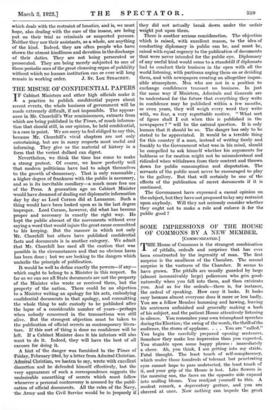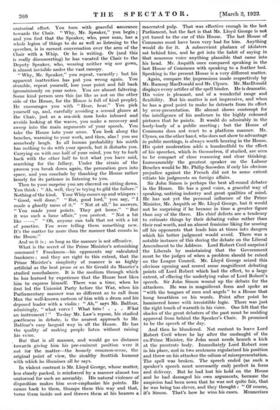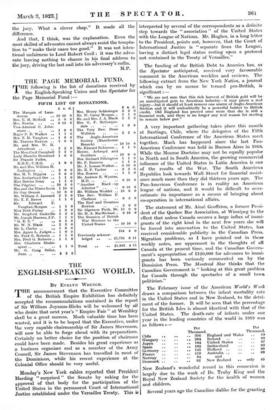SOME IMPRESSIONS OF THE HOUSE OF COMMONS BY A NEW
MEMBER. [commumicATEDA THE House of Commons is the strangest combination of •pitfalls, ordeal§ and surprises that has ever been constructed by the ingenuity of man. The first surprise is 'the smallness of the Chamber. The second surprise is the vastness of the Chamber. It seems to have grown. The pitfalls are usually guarded by large (almost inconceivably large) policemen who grin good- naturedly when you fall into them, and then extricate you. And as for the ordeals—there is, for instance, the ordeal of speaking. How easy it looks. It looks easy because almost everyone does it more or less badly. You see a fellow Member humming and hawing, leaving his sentences unfinished and generally making a hash of his subject, and the patient House attentively listening in silence. You remember your own triumphant speeches during the Election; the swing of the words, the thrill of the audience, the storm of applause. . . . You are "called." You begin the carefully prepared opening -sentences. Somehow they make less impression than you 'expected. You stumble upon some happy phrase : immediately a cheer. Ah, you think, I am getting into my stride. Fatal thought. The least touch of self-complacency, which under those hundreds of tolerant but penetrating eyes cannot hope to pass undetected, the least touch of it, and your grip of the House is lost. Like flowers in the morning sun, the faces on the opposite side expand into smiling bloom. You readjust yourself to this. A modest remark, a deprecatory gesture, and you are cheered at once. Now nothing can impede the great oratorical effort. You turn with graceful assurance towards the Chair. " Why, Mr. Speaker," you begin ; and you find that the Speaker, who, poor man, has a whole legion of things to do as well as listening to the speeches, is in earnest conversation over the arm of the Chair with a Whip. Or he is writing. Or (and this is really disconcerting) he has vacated the Chair to the Deputy Speaker, who, wearing neither wig nor gown, is almost invisible under the vast canopy.
" Why, Mr. Speaker," you repeat, vacantly ; but his apparent inattention has put you wrong again. You stumble, repeat yourself, lose your point and fall back ignominiously on your notes. You are almost faltering. Some kind person sees this (as like as not on the other side of the House, for the House is full of kind people). He encourages you with " Hear, hear." You pick yourself up, and, carefully avoiding a second glance at the Chair, just as a sea-sick maa looks inboard and avoids looking at the waves, you make a recovery and sweep into. the main arguments of your speech. You take the House into your arms. You look along the benches, warming to your work, and then, alas ! you see somebody laugh. In all human probability his mirth has nothing to do with your speech, but it disturbs you. Carrying on with one half of your mind, you try to hark back with the other half to test what you have said, searching for the fallacy. Under the strain of the process you break down again, the peroration goes into space, and you conclude by thanking the House rather lamely for its patience in listening to you.
Then to your surprise you are cheered on sitting down. You think : " Ah, well, they're trying to gild the failure." Nothing of the kind. Your Whip comes up and whispers : " Good, well done." " But, good lord," you say, " I made a ghastly mess of it." " Not at all," he answers. " You made your points. They got home." " But it was such a lame affair," you protest.. " Not a bit like ." " Oh, anyone can talk that rot with a bit of practice. You were telling them something new. It's the matter far more than the manner that counts in the House."
And so it is ; so long as the manner is not offensive.
What is the secret of the Prime Minister's astonishing command ? Frankness—his opponents say calculated frankness ; and they are right to this extent, that the Prime Minister's simplicity of manner is as highly artificial as the best prose or as Sir Gerald du Maurier's studied nonchalance. It is the medium through which he has learned by experience that the House best likes him to express himself. There was a time, when he first led the Unionist Party before the War, when his Parliamentary manner was so different as to call from Max the well-known cartoon of him with a drum and his deposed leader with a violin : " Ah," says Mr. Balfour, admiringly, " what verve ! What brio ! . . What an instrument ! " To-day Mr. Law's repose, his studied gentleness in debate, is the nearest approach to Mr. Balfour's easy languid way in all the House. He has the quality of making people listen without raising his voice.
But that is all manner, and would go no distance - towards giving him his pre-eminent position were it s not for the matter—the homely common-sense, the original point of _view, the stealthy Scottish humour with which he illumines all he says.
In violent contrast is Mr. Lloyd George, whose matter, less closely packed, is reinforced by a manner almost too oratorical for such an assembly. His natural violence of disposition makes him over-emphasize his points. He comes back to them, thumps them this way and that, turns them inside out and throws them at his hearers a macerated pulp. That was effective enough in the last Parliament, but the fact is that Mr. Lloyd George is not yet tuned to the ear of this House. The last House of Commons must have been very bad for him. Anything would do for it. A subservient phalanx of idolaters sat behind him, and he got into the habit of saying in that sonorous voice anything plausible that came into his head. Mr. Asquith once compared speaking in the last House of Commons with speaking to a feather bed. Speaking in the present House is a very different matter. Again, compare .the_ impressions made respectively by Mr. Ramsay MacDonald and Mr. Clynes. Mr. MacDonald displays every artifice of the spell binder. He is dramatic.
His voice is pleasant, and of a wonderful range and flexibility. But his matter is not impressive, and when he has a good point to make he detracts from its effect by over-presentation. He almost shows contempt for the intelligence of his audience in the highly coloured pictures that he paints. It would do admirably in the hurly-burly of a public meeting ; but the House of Commons does not react to a platform manner. Mr.
Clynes, on the other hand, who does not show to advantage in public meetings, is always worth hearing in the House. His quiet moderation adds a hundredfold to the effect of his speeches, which in themselves, if studied, are seen to be compact of close reasoning and clear thinking. Immeasurably the greatest speaker on the Labour Benches would be Mr. Philip Snowden if only his obvious prejudice against the French did not to some extent vitiate his judgments on foreign affairs.
Sir John Simon is perhaps the best all-round debater in the House. He has a good voice, a graceful way of speaking, untiring industry and great qualities of mind.
He has not yet the personal influence of the Prime Minister, Mr. Asquith or Mr. Lloyd George, but it would not be surprising if he became in time a greater -figure than any of the three. His chief defects are a tendency to estimate things by their debating value rather than their real worth, and an almost feminine liking for scoring off his opponents that leads him at times into dangers which his better judgment would avoid. There was a notable instance of this during the debate on the Liberal Amendment to the Address. Lord Robert Cecil surprised the Liberals by maintaining that the Government must be the judges of when a problem should be raised on the League Council. Mr. Lloyd George seized this obvious opening and scored some magnificent debating points off Lord Robert which had the effect, to a large extent, of effacing the underlying value of Lord Robert's speech. Sir John Simon wound up the debate for the attackers. He was in magnificent form and spoke as "with the tongues of men and angels " to a House that hung breathless on his words. Point after point he hammered home with irresistible logic. There was just the right touch of warmth in his voice. One felt that the shades of the great debaters of the past must be nodding approval from behind the Speaker's Chair. It promised _to be the speech of the day.
And then he blundered. Not content to leave Lord Robert Cecil where he lay after the onslaught Of the ex-Prime Minister, Sir John must needs launch a kick at the prostrate body. Immediately Lo.rd Robert rose in his place;-and in two sentences regularized his position sand threw on his attacker the odium of misrepresentation. The spell was broken. The speech ended (as such a speaker's speech must necessarily end) perfect in form and delivery. But he had lost his hold on the House and he had damaged his own arguments, because the suspicion had been sown that he was not quite fair, that he was being too clever, and they thought " Of course, it's Simon. That's how he wins his cases. Mesmerizes the jury. What a clever chap." It made all the difference. And that, I think, was the explanation. Even the most skilled of advocates cannot always resist the tempta- tion to " make their cases too good." It was not inten- tional unfairness to Lord Robert Cecil : it was the advo- cate leaving nothing to chance in his final address to the jury, driving the last nail into his adversary's coffin.
M.P.












































 Previous page
Previous page